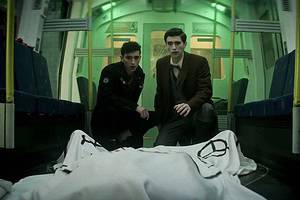Immediately following Don’t Worry Darling’s third act twist, I began to recall a viral interaction that took place between director Olivia Wilde and poor soul Maggie Gyllenhaal in a conversation they had for Interview Magazine. In it, Wilde says Chris Pine’s character in the film was inspired by Jordan Peterson, a psychologist and former professor who is heralded by conservatives for his traditionalist viewpoints. Wilde describes Peterson as a “pseudo-intellectual hero to the incel community” who “legitimizes certain aspects of their movement.”

I didn’t expect Olivia Wilde to dog-whistle her own movie weeks before it came out, but I was nonetheless ignorant of it, as were many fellow movie lovers who had been hotly anticipating Wilde’s sophomore feature from the jump. But then, after the many, many, many, many viral interactions that were documented over the film’s exhausting press cycle, some of them coming from Wilde in particular, we all found ourselves so, so tired. We tried to muster determination to look past the drama, as I’m sure we all find it valuable to judge a film on its own merits, but our excitement had been deflated.
After seeing the final product, the sad truth is that, in this very particular case, the film’s controversies happen to provide incredible insight into the failings of Don’t Worry Darling, a wannabe-Lynchian dystopia that spends more time abstracting its own artifice than giving nuance to what lies inside of it. Much like the film’s setting, Wilde’s flatly-feminist thriller struts gilded visuals but rings hollow upon even the simplest investigation. It is so stuck in its own head, a perplexing mystery box of unaddressed red herrings, that any of its reality is completely lost.

The film’s premise is the exact kind of beautiful, high-concept pitch we don’t see too often from studio output: a naive housewife (Florence Pugh) living in Victory, a carefree 50’s-inspired suburban community, comes to realize that the leaders of the community are hiding something sinister. After witnessing one of the fellow wives (KiKi Layne) have a rebellious outburst, she pursues what lies behind the curtain, only for everybody to convince her that she’s hallucinating. Her husband (Harry Styles), a hyper-horny working man, warns her not to rock the boat. But even his motivations begin to appear nefarious.
Nothing is quite as it seems, even if this is a concept we have seen many times before (The Stepford Wives comparisons have been a dime a dozen). Still, simple can be effective; there’s a reason the original version of this story appeared on The Black List in 2019. Unfortunately, screenwriter Katie Silberman’s drastic rewrite, likely assisted by Wilde, frontloads the mystery with several plot points, like high-magnitude earthquakes and a surprise plane crash. They feel like solid world-building as they are introduced but the film’s final moments fail to address most of them, resulting in a needlessly complicated version of an otherwise straightforward survival-horror story.

The film’s direction also feels heavy-handed. There are many uncomfortable sequences in which Pugh’s character is visibly tortured on screen, whether it’s through suffocation by plastic wrap or being crushed in between her hallway wall and a glass window pane. They’re well-directed, and Pugh is certainly committing to the insanity, but they all convey the same dramatic beat and its repetitiveness quickly becomes inane. Vague montage sequences of bloody inkblots and dancing showgirls add even more complexity into the mix, but it’s unclear what these aim to symbolize beyond surface level imagery.
Unsurprisingly, the film’s all-too-revealing twist also feels needlessly complicated, but it is such a nakedly politically-minded gotcha that it’s enough to distract from that. Going back to the aforementioned dog-whistling, Wilde’s rousingly, politically-charged declarations leading up to the film’s release (“Men don’t come in this movie”) suggest that she thinks of this movie as her feminist manifesto, a reflection of her anxieties and nightmares as a woman in the twenty-first century, admittedly a time where there is still much progress to be made.

Sadly, Don’t Worry Darling will do nothing to further any progress, settling for two-dimensional characterization and style-over-substance storytelling that provides no insight that hasn’t already been gleaned by her betters. Wilde claims this is a movie about blowing up a system that serves you, yet there is very little meaningful destruction to be seen. This shouldn’t be a surprise, however, seeing as Wilde has proven to comfortably serve the very system she herself claims to want to destroy. Turns out you can talk the talk all you’d like, but if you can’t walk the walk, you’d better start running.
Don’t Worry Darling is currently playing in theaters courtesy of Warner. Bros.
Wilde's vapid direction and Silberman's overly complicated script drown whatever glamour can be been gleaned from "Don't Worry Darling" and its high-concept premise.
-
GVN Rating 4
-
User Ratings (0 Votes)
0

Larry Fried is a filmmaker, writer, and podcaster based in New Jersey. He is the host and creator of the podcast “My Favorite Movie is…,” a podcast dedicated to helping filmmakers make somebody’s next favorite movie. He is also the Visual Content Manager for Special Olympics New Jersey, an organization dedicated to competition and training opportunities for athletes with intellectual disabilities across the Garden State.







